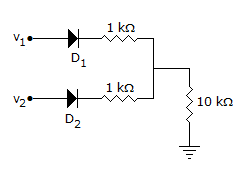Electronics and Communication Engineering - Analog Electronics - Discussion
Discussion Forum : Analog Electronics - Section 1 (Q.No. 7)
7.
In figure v1 = 8 V and v2 = 4 V. Which diode will conduct?


Answer: Option
Explanation:
D1 will conduct and the output voltage will be about 7 V. Therefore D2 will be reverse biased and will not conduct.
Discussion:
32 comments Page 4 of 4.
Aatif Khan said:
5 years ago
Option B is correct.
First, consider both the diodes forward bias.
Then with the help of nodal analysis find the voltage at junction 1k,1k and 10k.
{((V-8)/1k) +((V-4)/1k)+(V/10k)} = 0.
On solving the above equation we get, V = 5.71v.
Given that V1=8v and V2=4v which are positive terminal voltage for D1 and D2 respectively
for both diodes, we have a negative terminal voltage V=5.71v.
So D1 will conduct because Vp>Vn (condition for forwarding bias) (Vp=8v, Vn=5.71v)
D2 will not conduct because Vp<Vn (condition for reverse bias) (Vp=4v, Vn=5.71v).
First, consider both the diodes forward bias.
Then with the help of nodal analysis find the voltage at junction 1k,1k and 10k.
{((V-8)/1k) +((V-4)/1k)+(V/10k)} = 0.
On solving the above equation we get, V = 5.71v.
Given that V1=8v and V2=4v which are positive terminal voltage for D1 and D2 respectively
for both diodes, we have a negative terminal voltage V=5.71v.
So D1 will conduct because Vp>Vn (condition for forwarding bias) (Vp=8v, Vn=5.71v)
D2 will not conduct because Vp<Vn (condition for reverse bias) (Vp=4v, Vn=5.71v).
(8)
Sandhya said:
4 years ago
Thank you @Aatif.
(1)
Post your comments here:
Quick links
Quantitative Aptitude
Verbal (English)
Reasoning
Programming
Interview
Placement Papers